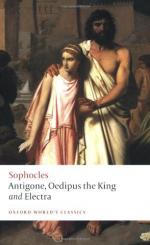|
This section contains 359 words (approx. 1 page at 400 words per page) |

|
Revenge
Revenge drives all of the action in Electra. The family history involves a horrific crime and most of the tragedies which follow are crimes committed to compensate for an earlier crime. Agamemnon sacrifices Iphigeneia, for which Clytemnestra kills him. For her crime, Orestes kills his mother, for which he is pursued by the Furies (although this aspect of the legend is not addressed in Sophocles's drama).
Public vs. Private Life
Since tragedy, according to Aristotle's definition in his Poetics, involves a central figure of more than common stature, key figures are often kings or other prominent political or national figures. Consequently, this makes it possible to interpret tragedies as both explorations of private psychology and public politics. For example, William Shakespeare's Hamlet is about murder, revenge, and madness, but it is also about the failure of proper political succession and ill-gotten power (Hamlet's uncle murders his brother the...
|
This section contains 359 words (approx. 1 page at 400 words per page) |

|




